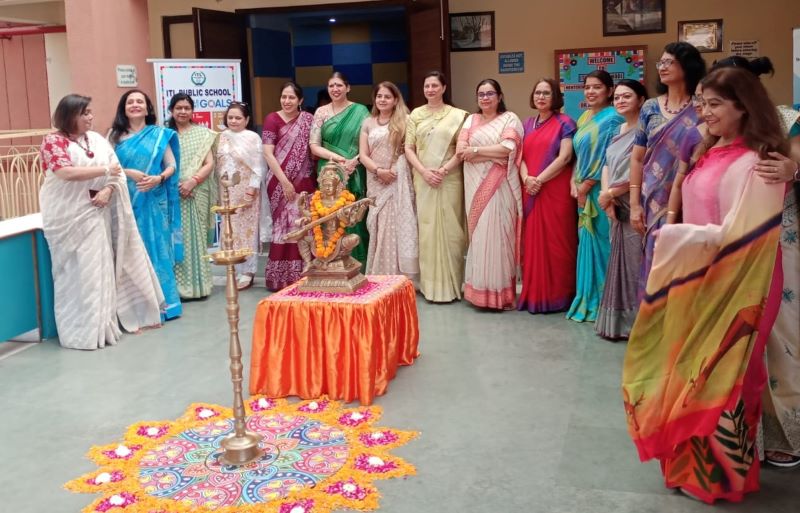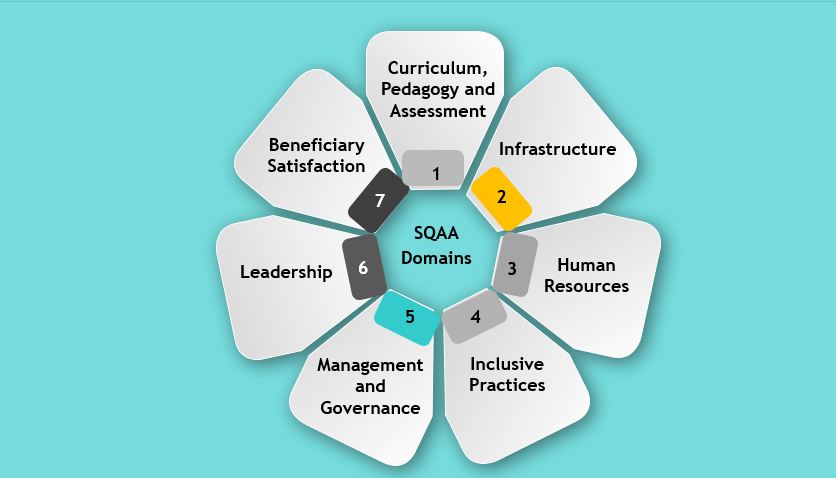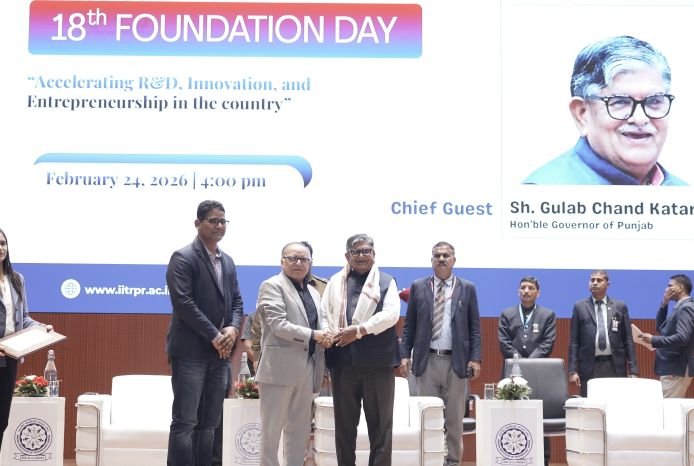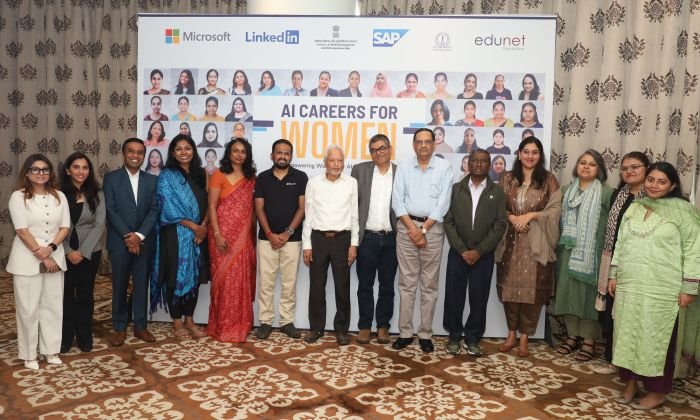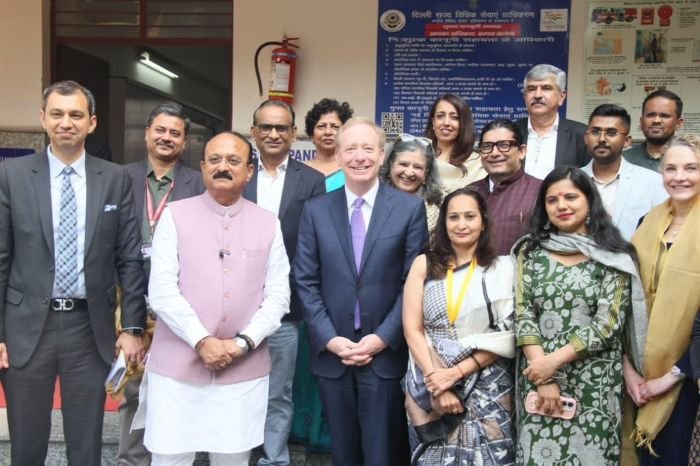
By Autar Nehru
With so much happening in the policy and regulatory environment after the NEP 2020 roll out, a vast majority of teachers and school leaders are naturally edgy on their changing role and seek expert help. Precisely with this need in mind, CBSE Sankalp Sahodaya South West Delhi held a 3-day ‘Mentoring the Mentors Program’ at ITL Public School, Dwarka from June 26-28 and linked it to the theme of commemoration of 3 years of NEP – 2020 & celebrating India’s G20 Presidency by empowering Education leaders.
The well-attended workshops on all the three days were held by well-known experts in the field and included Kalpana Kapoor on SQAAF, Prof. Suniti Sanwal from NCERT on NCF (FS) and Dr Sudha Acharya, NPSE chairperson on HPC. Former Education Secretary Anita Karwal (IAS), Himanshu Gupta, Director of Education 9Delhi), Dr. Rita Sharma, Director SCERT (Delhi), delivered keynotes on relevant themes.
The acoustically beautiful auditorium on the 3rd floor of ITL Public School resembled a big classroom of packed learners (teachers in this case) engaged in rapt attention for over 6 hours without usual snack breaks (working lunch lasted just over half an hour). Unusual for teachers? Yes, but when the topics and mentors/lecturers are both appealing and necessary, you become a child with all his or her curiosity and engagement.
Ever since, the National Education Policy (NEP) was announced in July 2020, the education apparatus in the country from pre-schooling or early education to doctorate level is experiencing a churn as the implementation process is underway. Even though education is a concurrent subject but much of the onus is on the union government to develop models, national roadmaps, legal frameworks, curriculum frameworks, etc in a top down approach for setting norms. The result is, a radical transformation aided by technological integration as an undercurrent is sweeping all sub systems of education in India. Schools and teachers are naturally part of this transformation and in need of constant education on this.
With CBSE, the national school board under the union Ministry of Education, being the de facto choice and lab for rolling out and piloting these changes, country’s popular community of CBSE schools, jokingly receive circulars ‘week in, week out’. So under these situations, CBSE Sankalp Sahodaya South West Delhi workshops were at right time and about all right things.
Anita Karwal (IAS), the former Secretary, Department of School Education and Literacy and one of the most influential voices on school education in India who helmed important policy reforms in her tenure, set the tone for the 3-day conference by illustrating how the mindset of school teachers and their upskilling will greatly determine if India indeed reaps the demographic dividend in the next 2-3 decades as its working population peaks.
Himanshu Gupta, Director of Education (Delhi) spoke of human centricity of school education as a way of achieving sustainability mindset. He said that human interaction, group activities and engaging children is necessary as the intrusion of ed tech has given rise to concerns on psychological issues among them and there is a need to limit their screen time by alternative engagements to ensure their well-being. He shared experience from happiness curriculum of Delhi government on how it is able to calm both the teachers and students and helping innovative assessments. “It is teachers who directly deal with humans than doctors or people from other professions, so teachers must contribute to make school aspirational for parents and students,” he added.
In her lucid talk, Dr Rita Sharma, Director SCERT (Delhi), spoke about a mindset curriculum where teachers can be empowered to perform as problem solvers and counselors. She illustrated how happiness curriculum and entrepreneurship curriculum is working on ground and the changes she has seen in Delhi government schools with these. She also referred to foreign training tours of school principals, mentors and leadership training at IIM Ahmedabad and other institutions in the country. “Leadership is important and an institution as good as its leaders. Experiment, learn and change is happening and helping the cause of school education,” she said. Director SCERT also said that government was looking at increasing pre-service training of teachers to 3-6 months and can be also asked to serve in private schools as they are also likely to be employed by the private sector as well.
Prof. Suniti Sanwal, Head of the Department, Elementary Education, NCERT, shared the vision of NCF-FS and how it has been intended to standardize and stimulate the first 8 eight years of education for every child. She informed that new textbooks are being prepared for foundational stage and will be available soon. She said that age 6 is the entry age for class 1 and lowly everybody is slowly moving to this norm and by 2027, the issue will be hopefully sorted out. She was responding to state like Delhi having two pre-school classes and NEP 2020 talking about 3-6. She cited how Maharashtra has incrementally done it over two years and 21 states and UTs are already compliant.
Kalpana Kapoor, Edupreneur, Mentor & Leadership Coach explained in great detail the School Quality Assessment and Assurance Framework (SQAAF) that aligns schools with NEP 2020. She simplified the mammoth looking framework and assured the teachers that it is doable and in interest of schools. She talked about the seven domains under the framework and how 84 standards under these domain are formulated. She offered a peep into documentation and SOP for SQAAF and also explained how rating works.
Dr Sudha Acharya, Principals ITL Public School, NPSE chairperson and president of CBSE Sankalp Sahodaya South West Delhi, who is working on the Holistic Progressive Card (HPC) conceptualization and piloting under NIPUN Bharat with the Ministry of Education took the floor to educate fellow leaders and educators on the stage wise-age wise concept of HPC and its journey so far. She said that the first stage is almost over with 72 pilot schools in the country and it may be rolled out in 500 schools for further validation and testing before eventually made mandatory for all CBSE schools. She demonstrated how her school has done it and a team of primary teachers from the school presented a skid and showcased their Jaadui Pitara for the visitors. Dr Acharya remained optimistic that HPC is empowering and will offer a new way of looking at holistic assessment besides changing teaching/learning process in schooling.
She said, “Principals and teachers must read the policy and NCF documents and make themselves aware of the changes that regulators and leadership of the country wants to make in the process of NEP 2020 implementation and making India great in coming decades. G20 presidency is our moment to put our best foot forward and be ready for global expectations.”


